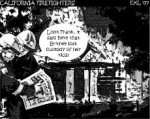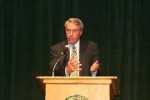Hugo Chavez and Venezuela’s New Deal

Editor’s note: Susan Hernandez is a non-traditional student at C.S.C. and is married to a Venezuelan native and has family living in Venezuela. The current administration along with the mainstream media has branded the legally elected Venezuelan president, Hugo Chavez a Fidel Castro wanna be. They claim that he mirrors Cuba’s leader, that he is a dictator who is taking away the rights of the people and squandering the wealth of the country (oil).
This description appears to be taken as fact. Why? If Chavez is so bad why does he continue to be elected by the voters of the country? And why would former President Jimmy Carter and others sent to observe the elections, sanction the votes as democratic, fair and legal?
I can see how Chavez can be compared to Castro: both men are comfortable in military uniforms, they speak to the public for hours, they are both self proclaimed revolutionaries, and both appear to enjoy the game of poking a stick at the big dog with the big teeth called George W. Bush. They both have a gift for making him growl. The differences are that Castro came to power with a gun and Chavez with a legal election. Castro controls the media through censorship.
Chavez must use a government sponsored television station to counter negative press from his country’s privately held media sources. Castro holds all the power. In contrast, the people of Venezuela are becoming empowered by a president who encourages them to read in order to understand their rights under the new constitution. He inspires them to vote. He tells them that participation in their government is needed in order for it to work. Even with such facts, there are those who still seek to discredit and demonize Chavez with negative words like “dictator,” “terrorist,” and “oppressor.” Why?
In March of 2005, I traveled to Venezuela with my family. In the past, I was shocked at the decline in the standard of living for the poor and the middle class, the decay of the country’s infrastructure, and rampant corruption. On this visit, I observed positive changes for the low income and poor citizens of the country. I was happy to see improvements to the infrastructure, social programs, medical care, low income housing and the decline of bureaucratic corruption.
It is apparent to me that the leadership of Hugo Chavez does mirror another famous leader; not Fidel Castro, but Franklin Delano Roosevelt, and the changes are reminiscent of the “New Deal.”
Roosevelt ran for president in 1932, during the Great Depression. Fifteen million people were unemployed, and 50% of the banks were closed. F.D.R.’s campaign promised a New Deal for the forgotten man. The liberal Roosevelt won by a 60% landslide, carried into office by the poor and disenfranchised. Hugo Chavez ran for president at a time when corruption was unimpeded within the Venezuela government. The lending rate was over 50%, and banks were foreclosing on homes and businesses. There was a lack of available quality medical care, housing, and education for the poor.
Chavez promised a revolution for the common man. The poor exercised their democratic right to vote and elected Hugo Chavez-Frias by a 56% margin as the president of Venezuela.
Roosevelt’s government restructured the banking institutions, implemented federal regulations over existing banks, regulated the stocks and bonds market, funded public works projects that put people back to work and changed the way in which the government dealt with the poor in this country.
Chavez passed new regulations for the banking industry, lowered the astronomical interest rates, and created new regulations to stop government corruption. Over the past few years, his government has spent more than $20 billion of oil profits on social programs to provide subsidized food, free health care, education, and public works projects like bridges, subways, low income housing, museums, and parks. Neighborhood schools help multigenerational citizens to become literate so that they can better understand their rights under the constitution. Because the citizens know their rights they took to the streets in protest when a coup (allegedly backed by the U.S.) threatened to dissolved the constitution and remove their legally elected president from office in April 2002.
During F.D.R.’s presidency, Americans gathered around their radios each week to listen to his Fireside Chats. Today Chavez speaks to the nation via the governmental television station. Every Sunday citizens tune into “Alo Presidente” and listen to Chavez speak directly to them about the issues that are facing the nation. Everyone is welcome to call and talk directly to their president.
President Roosevelt used the Good Neighbor Policy to create good will with our South American neighbors. Last year President Chavez sent reduced rate heating oil to the low-income citizens of the United States. Bernie Sanders, a Vermont congressman, referred to it on his informational web site as “the act of a good neighbor.”
The Republican Party claimed that Roosevelt was too liberal and that he was trying to amass too much power by running for a third term. They further criticized him for deficit spending, and claimed that his programs were not working.
The Venezuelan opposition wants to impose term limits. They say that Chavez is greedy and misusing the oil profits. I think the citizens who have benefited from, free health care, new social programs, more jobs and an increase in their annual incomes must disagree because they keep electing him.
Chavez’s political critics further claim that he is taking away their rights and imposing censorship. Under the new regulations intentionally reporting information that is untrue is now against the law. Furthermore, programming that is inappropriate for children can not be aired until after 11 p.m. I believe that there is an open political controversy being played out in the media and that freedom of speech and democracy are both alive and well in Venezuela.
Lastly, like F.D.R., Chavez is a masterful politician who came into power because he understood that by giving a person the right to vote, you had better gain and keep their respect. He knows that if you disenfranchise a large enough group of people, they are armed with a ballot and politically dangerous. They can use their vote to buy themselves a “New Deal” and through the democratic process set a revolution in motion that will create enough controversy to keep the world enthralled.
Knowing all of this, the American people should ask: Why does President Bush and his administration seek to demonize President Chavez? Why does the press fail to present both sides of the Venezuelan political story? And finally, could oil have anything to do with it?





